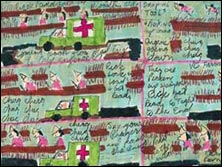 As I was cleaning my refrigerator and carting out trash, I had C-Span2 on in the background (C-Span2 turns into BookTV every weekend) … George Weigel droned on about the Pope and bemoaned the absence of a Biblical presence in modern-day Europe …
As I was cleaning my refrigerator and carting out trash, I had C-Span2 on in the background (C-Span2 turns into BookTV every weekend) … George Weigel droned on about the Pope and bemoaned the absence of a Biblical presence in modern-day Europe …
Then there was another program, featuring a rod-thin, harsh-voiced woman, her bony hands grabbing a podium. The bottom of the screen said her name is Nina Berman, “Author & Photographer || ‘Purple Hearts: Back from Iraq.'” (And there’s a book by the same name available at Powell’s.)
“A lot of them are blind,” she said. “One Army Ranger is blind. He sees nothing but black all day and black all night, and titanium holds his brain inside his skull …”
She went on. “Here is a photo of a quadraplegic who is not counted among the 15,000 (or so) combat-wounded because he wasn’t wounded in combat. He was in Tikrit driving a tank, and his commander ordered him to knock down a wall adorned with Saddam’s portrait. As his tank hit the wall, a piece of concrete flew in and severed his spinal cord. …”
 The Web site for the National Vietnam Veterans Art Museum — which is exhibiting Berman’s photographs — was easy to find, and it’s a remarkable Web site. Nina Berman’s show is at the museum in Chicago until April 30, 2006. There are also a 30-year anniversary selection of works from the permanent collection, and “Things We Carried,” an exhibit that may be rented. Also on display through May 1, 2006: Trauma and Metamorphosis II (that’s a snippet of the image on the right). (Scan the home page to see all.)
The Web site for the National Vietnam Veterans Art Museum — which is exhibiting Berman’s photographs — was easy to find, and it’s a remarkable Web site. Nina Berman’s show is at the museum in Chicago until April 30, 2006. There are also a 30-year anniversary selection of works from the permanent collection, and “Things We Carried,” an exhibit that may be rented. Also on display through May 1, 2006: Trauma and Metamorphosis II (that’s a snippet of the image on the right). (Scan the home page to see all.)
Then I glanced through the latest stories at Memeorandum. Besides all the reports on the NSA revelations, there was a major piece today in the Washington Post by Ellen Knickmeyer on Iraqi civilian deaths. And it’s those pristine airstrikes — that Rummy is so proud of — that are killing so many civilians, and that are on the increase, reports Dahr Jamail. On Nov. 27, I wrote about the the uptick in the aerial war, as reported by Seymour Hersh, in an attempt to cut back troop casualties.
“These people died silently, complaining to God of a guilt they did not commit,” Zahid Mohammed Rawi, a physician, said in the town of Husaybah. Rawi said that after roughly one week into Operation Steel Curtain, which began on Nov. 5, medical workers had recorded 97 civilians killed. At least 38 insurgents were also killed in the offensive’s early days, Rawi said.
In a Husaybah school converted to a makeshift hospital, Rawi, four other doctors and a nurse treated wounded Iraqis in the opening days of the offensive, examining bloodied children as anxious fathers soothed them and held them down.
“I dare any organization, committee or the American army to deny these numbers,” Rawi said. …
Today, The Nation‘s David Corn talked about the WaPo story in a piece titled “Silent Night”:
This reminds me of a pet issue I adopted during the Afghanistan war. At that time, the Bush administration and the Pentagon often refused to acknowledge civilian casualties. Time and time again, a bomb would end up blasting apart a home, a business, a wedding reception, and men, women and children would be blown to bits. Rather than admit wrong, the Pentagon routinely denied any such thing had happened, often claiming that all its ordnance had fallen upon Taliban fighters and no one else. Reporters would then visit these sites, talk to eyewitnesses and local leaders (who usually were anti-Taliban) and discover that the allegations of misguided (and lethal) bombing were quite credible. Meanwhile, the Pentagon would ignore or misrepresent the facts as long as it could. On rare occasions, it might concede something had gone wrong. Then, the Bush administration would do nothing to make it up to the innocent victims. Concurrently, reports of the bombings and dead civilians would be broadcast far and wide through the Muslim and Arab worlds–often in far more explicit detail than an American would see within the US media. It’s arguable that these images and reports had much to do with souring (or further souring) much of the Islamic world on the United States.
In war, shit happens. But any just warrior is obligated to minimize civilian deaths, to acknowledge wrong when it happens, and, if possible, to do all that is possible to make up for the damage done. …
Any just warrior would. And so would any just U.S. citizen. It’s the least we owe U.S. soldiers who will, as Nita Berman said tonight, carry the psychic as well as physical wounds the rest of their lives, as will the Iraqi and Afghani civilian survivors to whom we owe the same lifelong commitment of caring and compassion.

I just watched a profoundly affecting program on C-Span2 … the reading of various stories, documents, poems related to the U.S. practice of torture … it was hosted by PEN, a group of writers.
The audio of the Nov. 11 program is available, and I can’t recommend it enough.
The program list — I boldfaced those which most affected me. I missed the first six, incl. Edward Albee.
Great Diary!
‘Purple Hearts: Back from Iraq’ is a great Book Purchase, Believe Me!!
Here’s another Many Should Read:

War and the Soul:Healing Our Nation’s Veterans from Post-traumatic Stress Disorder
by Edward Tick
And other Books/Studies about PTSD, because this Country, I’m afraid, will be Experiancing a Wave of those effected by this, more so than of previous WarTime PTSD because of the Mutiple In-Theater Tours!!
As for Afganistan. I just posted the following up at my blog: ‘Imagine’ A World Of Peace,Understanding,Tolerance
The following is a part of an E sent to friends by their son, just a few days before Christmas, he is serving in Afganistan, for the Second Tour there with a Tour In-Theater Iraq In-between those!
We have received Many Correspondence from In-Theater Troops, both Iraq and Afganistan, and most are Simple and To The point as this.
The rest of the E is personal, this part is the Reality!!!
A ‘Very Un-Happy Holiday’s and Un-Merry Christmas’, from Iraq and Afganistan!!!!
***
As long as we hate, there will be people to hate
:George Harrison: Musician, producer and composer, member of The Beatles, 1943-2001
****
Democracy don’t rule the world, You’d better get that in your head; This world is ruled by violence, But I guess that’s better left unsaid.
: Bob Dylan : American folksinger, b.1941
*****
James Starowicz
USN ’67-’71 GMG3 Vietnam In-Country’70-’71 COMNAVFORV
Member: Veterans For Peace
VFP ‘Declaration Of Impeachment’
Sign On and Pass Link To Others
“We, having dutifully served our nation, do hereby
affirm our greater responsibility to serve the cause
of world peace by applying the concept of engaging
conflict peacefully, without violence.”
Veterans For Peace
I read an artical yesterday, Jim, about DU and all the deaths it has caused among our own troops. I hope you know this is todays Agent Orange. The government has hid this away from the general populus so good that they think it is a farce to even address.
The VA has got a lot of splainin to do, IMHO about lots of things. Thank you for all that you do for us veterans. hugs and Happy Holidays.
“The government has hid this away from the general populus so good that they think it is a farce to even address.”
That’s an Understatement and another Deja Vu from ‘Nam! Agent Orange is Still hidden away and Spun as to the Least of the Facts! Especially as to the Vietnamesse who have Suffered and Died from it’s effects even to today!
It’s also a Deja Vu this call of Troop Withdrawal from rummy, Same Same Ala ‘Nam!!
But I’m Really Worried about the Number and Results from those who will be Wartime PTSD and DU infected Troops and the Iraqi’s as well!!!!
currently at Fort Campbell. She said that they are getting their first round of soldiers posted there who have serious time in Iraq. Her husband was part of the first Iraq war and witnessed the highway of death and it seemed that that was about all he could handle. He is almost at retirement and has been deemed physically unable to deploy so he has been doing a lot of training of new troops. Their next door neighbor is a soldier though with serious time under his belt in Iraq. She has been recently going through a period of not being able to sleep and she says that many times at 4:00 am she has heard something outside and looked out the window to find him walking around outside in his yard. Sounds so familiar to what the Vietnam vets went through. He told her husband that he had to kill a lot of young boys over there.